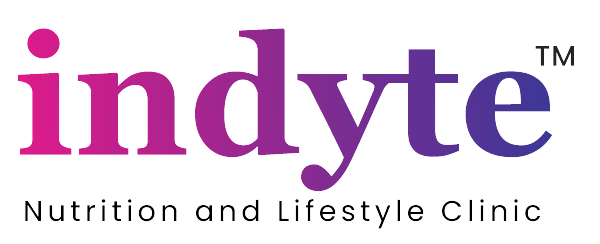- May 9, 2024
- PRIYANKA MAHESHWARI
- Comment: 0
- PCOS & PCOD
Polycystic Ovary Syndrome (PCOS) is a hormonal imbalance affecting millions of women worldwide. It disrupts the body’s ability to utilize insulin effectively, leading to a cascade of symptoms like irregular periods, unwanted hair growth, weight gain, and acne. While there’s no single cure for PCOS, managing diet plays a crucial role in keeping symptoms under control and promoting overall well-being. This blog delves into the connection between diet and PCOS, explores popular dietary approaches, and offers additional tips for creating a PCOS-friendly eating plan.
Understanding PCOS and the Food Connection
PCOS disrupts the body’s ability to use insulin, a hormone responsible for transporting sugar (glucose) from the bloodstream into cells for energy. This insulin resistance causes blood sugar levels to rise, leading to a chain reaction of hormonal imbalances. Under the influence of these imbalanced hormones, the ovaries may produce multiple small cysts and fail to ovulate regularly.
What are the first Signs of PCOS?
While symptoms can vary from woman to woman, some common signs of PCOS include:
- Irregular periods: This is often the first noticeable symptom. Periods may be infrequent, heavy, or unpredictable.
- Excess androgen (male hormone) levels: This can manifest as unwanted hair growth on the face, chest, or abdomen, as well as acne and male-pattern baldness.
- Weight gain and difficulty losing weight: Insulin resistance can lead to weight gain, particularly around the midsection.
- Skin problems: Oily skin, acne breakouts, and skin tags are common occurrences.
- Ovulation issues: PCOS can lead to infrequent or absent ovulation, making it difficult to conceive naturally.
It’s important to note what distinguishes PCOS from PCOD (Polycystic Ovarian Disease). While the terms are sometimes used interchangeably, there exists a subtle difference between PCOS and PCOD. PCOS typically involves a wider range of symptoms beyond just ovarian cysts, including the hormonal imbalances mentioned above. PCOD, on the other hand, may solely focus on the presence of multiple cysts in the ovaries without necessarily causing the hormonal disruptions characteristic of PCOS.Dietary Approaches for Managing PCOS Symptoms
Finding the right diet for PCOS management is an individual journey. However, several popular dietary approaches have proven effective in regulating blood sugar, reducing inflammation, and alleviating PCOS symptoms. Here’s a closer look at three widely recommended options:
- Low-glycemic index (GI) Diet:
The glycemic index (GI) is a ranking system that measures how quickly a food raises blood sugar levels. Low-GI foods are digested and absorbed slowly, leading to a gradual rise in blood sugar. This, in turn, helps to minimize insulin spikes and associated hormonal disruptions.
Benefits of a Low-GI Diet for PCOS:
- Improved blood sugar control: By prioritizing low-GI choices, you can regulate blood sugar fluctuations, promoting better overall health.
- Reduced cravings: Low-GI foods keep you feeling fuller for longer, reducing cravings for sugary and processed snacks.
- Weight management support: Maintaining healthy blood sugar levels can aid in weight management efforts, a common concern for many women with PCOS.
Low-GI Food Examples and Recipe Ideas:
- Non-starchy vegetables (broccoli, spinach, carrots)
- Whole grains (brown rice, quinoa, oats)
- Legumes (beans, lentils)
- Lean protein sources (fish, chicken, tofu)
- Unsaturated fats (avocado, nuts, olive oil)
Sample Low-GI Meal Plan:
- Breakfast: Greek yogurt with berries and chia seeds.
- Lunch: Grilled chicken salad with mixed greens, quinoa, and vinaigrette dressing.
- Dinner: Salmon with roasted vegetables and brown rice.
- Snacks: Apple slices with almond butter, veggie sticks with hummus.
- Mediterranean Diet:
The Mediterranean diet emphasizes a balanced approach, focusing on whole, unprocessed foods. It prioritizes fruits, vegetables, whole grains, legumes, and healthy fats like olive oil. This dietary pattern is rich in antioxidants and anti-inflammatory properties, which can be beneficial for managing PCOS symptoms.
Benefits of the Mediterranean Diet for PCOS:
- Improved insulin sensitivity: The focus on whole grains and healthy fats promotes better blood sugar control.
- Reduced inflammation: Chronic low-grade inflammation is linked to PCOS. The Mediterranean diet’s emphasis on anti-inflammatory foods can be helpful.
- Promotes heart health: The Mediterranean diet is recognized for its heart-healthy benefits, which are crucial for overall well-being.
Mediterranean Diet Food Examples:
- Fruits (berries, oranges, apples)
- Vegetables (tomatoes, leafy greens, broccoli)
- Whole grains (whole-wheat bread, brown rice, quinoa)
- Legumes (beans, lentils, chickpeas)
- Healthy fats (olive oil, nuts, seeds)
- Fish and seafood (salmon, tuna, sardines)
- Lean protein (chicken, turkey)
- Dairy (in moderation, yogurt, cheese)
Sample Mediterranean Meal Plan:
- Breakfast: Whole-wheat toast with avocado and scrambled eggs.
- Lunch: Greek salad with grilled chicken breast and quinoa.
- Dinner: Baked cod with roasted vegetables and whole-wheat couscous.
- Snacks: Olives, a handful of mixed nuts, and fruit with a dollop of Greek yogurt.
- Intermittent Fasting:
Intermittent fasting (IF) is an eating pattern that cycles between periods of eating and fasting. It doesn’t restrict specific foods but focuses on when you consume them. Popular IF methods include the 16/8 method (fasting for 16 hours and eating within an 8-hour window) or the 5:2 method (eating normally for 5 days and restricting calories for 2 non-consecutive days).
Potential Benefits of Intermittent Fasting for PCOS:
- Improved insulin sensitivity: Studies suggest that IF can improve insulin sensitivity, potentially benefiting blood sugar control in PCOS.
- Weight management support: IF can lead to reduced calorie intake overall, which can aid in weight management.
- Reduced inflammation: Some research indicates that IF may have anti-inflammatory effects, which could be helpful for PCOS.
Considerations for Intermittent Fasting with PCOS:
- Consult a healthcare professional: It’s crucial to discuss IF with your doctor before starting, especially if you have any underlying health conditions.
- Listen to your body: Don’t push yourself to fast for longer than feels comfortable.
- Stay hydrated: Drinking plenty of water is essential during fasting periods.
- Focus on nutrient-dense foods: When you do eat, prioritize whole, unprocessed foods to ensure proper nutrient intake.
Additional Tips for a PCOS-Friendly Diet:
- Portion Control: Regardless of the dietary approach you choose, practicing mindful portion control is key. Use smaller plates, chew your food thoroughly, and listen to your body’s hunger cues.
- Limit Added Sugars and Refined Carbs: Sugary drinks, processed foods, and refined carbohydrates can cause blood sugar spikes and exacerbate PCOS symptoms. Opt for whole grains and naturally sweet fruits instead.
- Stay Hydrated: Adequate water intake is crucial for overall health and helps regulate body functions. Aim for at least eight glasses of water daily.
- Individualized Plans: The best diet for PCOS management may vary from person to person. Consider consulting a registered dietician or nutritionist to create a personalized plan that aligns with your preferences and health goals.
Conclusion:
Diet plays a powerful role in managing PCOS symptoms and promoting overall well-being. Exploring dietary approaches like the low-glycemic index, Mediterranean diet, or intermittent fasting (with proper guidance) can be valuable tools. Remember, the most sustainable approach is the one you can incorporate into your lifestyle for the long term.


